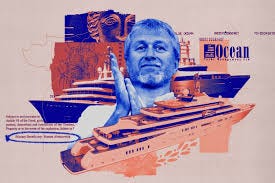Why Journalism Matters
The travails of a famous Russian oligarch.Illegal Russian timber floods the EU and who wins the award for corrupt person of the year?
4 minute read
Roman Abramovich in 2025. The oligarch, the super yachts and the taxes he hasn’t paid.

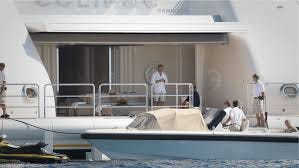
In 2011-2012 the star of the Russian-Israeli oligarch Roman Abramovich was very much in the ascendant.
On Christmas Day 2011, Abramovich could be found dressed in a linen shirt and shorts on the deck of his superyacht the Eclipse. He was getting ready to throw a lavish New Year’s Eve Party at his estate on the Caribbean island of Saint Barthélemy where the guests would include Rupert Murdoch, George Lucas and Harvey Weinstein.
Caviar canapés and Cristal champagne were on the menu and there would be live music from the Red Hot Chilli Peppers. The Eclipse itself was the height of luxury for a meet and greet, being at the time the world’s longest superyacht with two swimming pools, two helipads and a disco hall, not to mention its own mini submarine.
Later, in 2012 his Chelsea Football Club won its first Champions League Final making him the toast of British and European Football.
And those who might question the legality and probity of the origins of his wealth from the last days of the crumbling Soviet Union were given pause by a high court decision in London brought down after he was sued unsuccessfully by his former partner Boris Berezovsky. Berezovsky waccused Abramovich of blackmail, breach of trust, and breach of contract, seeking £3 billion in damages.
In August 2012 the High Court dismissed the case with the judge finding Berezovsky ‘an unimpressive and inherently unreliable witness, who regarded truth as a transitory, flexible concept, which could be moulded to suit his current purposes".
Abramovich on the other hand was judged to be ‘a truthful, and on the whole reliable witness’.
Sanctioned in UK and EU
Now, in 2025, Abramovich’s circumstances tell us a very different story. Since the war in Ukraine in 2022 he has been sanctioned both in the EU and UK because of his perceived closeness to Putin, with his vast property assets frozen. He has had to sell Chelsea FC without receiving any proceeds from the sale and he cannot travel to Britain or the EU.
In fact, according to documents opened up by the International Consortium of Investigative journalists in their Cyprus Confidential investigation, Abramovich may owe huge sums in unpaid tax in the UK in addition to taxes he already owes in Cyprus. And he could face criminal action and penalties for evading taxes in both the EU and the UK.
(The investigation is based on a huge data leak of financial files from firms in Cyprus in 2023 which shows how many Russian oligarch backers of Putin were enabled to hide their assets from Western sanctions after the invasion of Ukraine.)
In an attempt to shelter it from UK tax, much of Abramovich’s vast financial empire of hedge funds has been run through a holding company called Keygrove in the British Virgin Islands.
There is nothing inherently illegal about setting up shell companies in the BVI, but as The Bureau of Investigative Journalism in the UK, working as part of of the Cyprus confidential investigation, reports: “UK tax laws state that a company’s residence – and therefore its tax jurisdiction – is based on where it is centrally managed and controlled. In other words, it's about where the business decisions take place.”
Between the late 1990s and early 2022, the billionaire held as much as $6bn in a global network of hundreds of hedge funds. The sums totalled nearly half his estimated fortune.
Huge returns
These generated huge returns, which were then used to bankroll other parts of his business empire – including his financing of Chelsea Football Club.
At the heart of the scheme was Eugene Shvidler, a former Chelsea FC director and a billionaire businessman in his own right, who is currently challenging the UK government's decision to sanction him for his close links to Mr Abramovich.
Mr Shvidler moved to the USA after Russia's invasion of Ukraine, but from 2004 until 2022 he lived in the UK, with properties in London and Surrey.
A tax expert told the BBC that evidence Mr Shvidler had been making strategic decisions on the investments while based in the UK, and not in the BVI, was "a pretty big smoking gun", suggesting the companies should have been paying UK tax.
It is estimated that Abramovich may owe as much as £1 billion in tax to the UK which would provide a considerable sum that could be used for investment in public services in the currently cash-strapped country.
Meanwhile, it has been discovered that a company ultimately owned by Roman Abramovich set up a fake superyacht-leasing business in Cyprus in an apparent attempt to evade millions of euros in tax. This has been reported by the Organised Crime and Corruption Reporting Project (OCCRP) working as part of the Cyprus Confidential investigation.
Between 1999 and 2010, the former Chelsea Football Club owner assembled a fleet of superyachts worth around $1.2 billion, including the Eclipse.
The yachts spent part of the year sailing in European waters. Operating them was expensive, and under EU law, value-added tax was due on everything needed to keep them in service — fuel, staff, port fees, maintenance, and more. But these costs were exempt from the EU tax for vessels used for commercial purposes.
To claim the exemption, people working for Abramovich devised a complex scheme in which the luxury vessels were leased to what looked like independent customers paying to go on a cruise for a week or two. In reality, the companies hiring the superyachts were owned by an offshore trust whose beneficial owner was Abramovich.
Unpaid tax
Cypriot tax officials later found that the yachts were not in fact used commercially, and in 2012 the country’s tax authority ordered Abramovich’s company to pay 14 million euros ($18.5 million) to cover the unpaid tax.
Lawyers for the company tried to overturn the order in court, but the appeal was finally dismissed last year. Representatives for Abramovich did not respond to questions about whether the outstanding tax bill had been settled.
It is not known whether tax authorities in the UK and elsewhere in the EU could force the sale of frozen assets to secure the payment of Abramovich’s tax liabilities.
Reference
4 minute read
Illegal timber pours into EU from Russia despite sanctions imposed after invasion of Ukraine

It seems that EU sanctions against Russian timber which were implemented in early 2022 have turned into something worse than a bad joke.
UK non profit environmental investigators Earthsight have uncovered a booming trade in illegal Russian timber which can be traced across all 27 EU members, breaching war sanctions.
Earthsight has used the full range of investigative and undercover techniques to show that there is a ‘steady flow of Russian plywood coming into the EU, often through third party countries like Turkey, Kazakhstan and China’.
As the Earthsight report explains: “These companies are selling their illegal wood across the continent, and their customers include important manufacturers of climbing walls, toys, flooring, and other products.”
Through third countries
The UK-based NGO estimates that more than 500,000 cubic metres of ‘blood’ timber, with a retail value of over 1.5 billion Euros, has flowed from Russia through third countries and into the EU since sanctions were imposed in July 2022.
The imports are now at some of the highest levels ever seen. Over 700 cubic metres are arriving at EU ports and borders every day, equivalent to 20 large lorries or shipping containers. All 27 EU member states receive likely illegal ply, with the largest volumes shipped to Poland, followed by Germany, Spain, Portugal, Italy and Estonia.
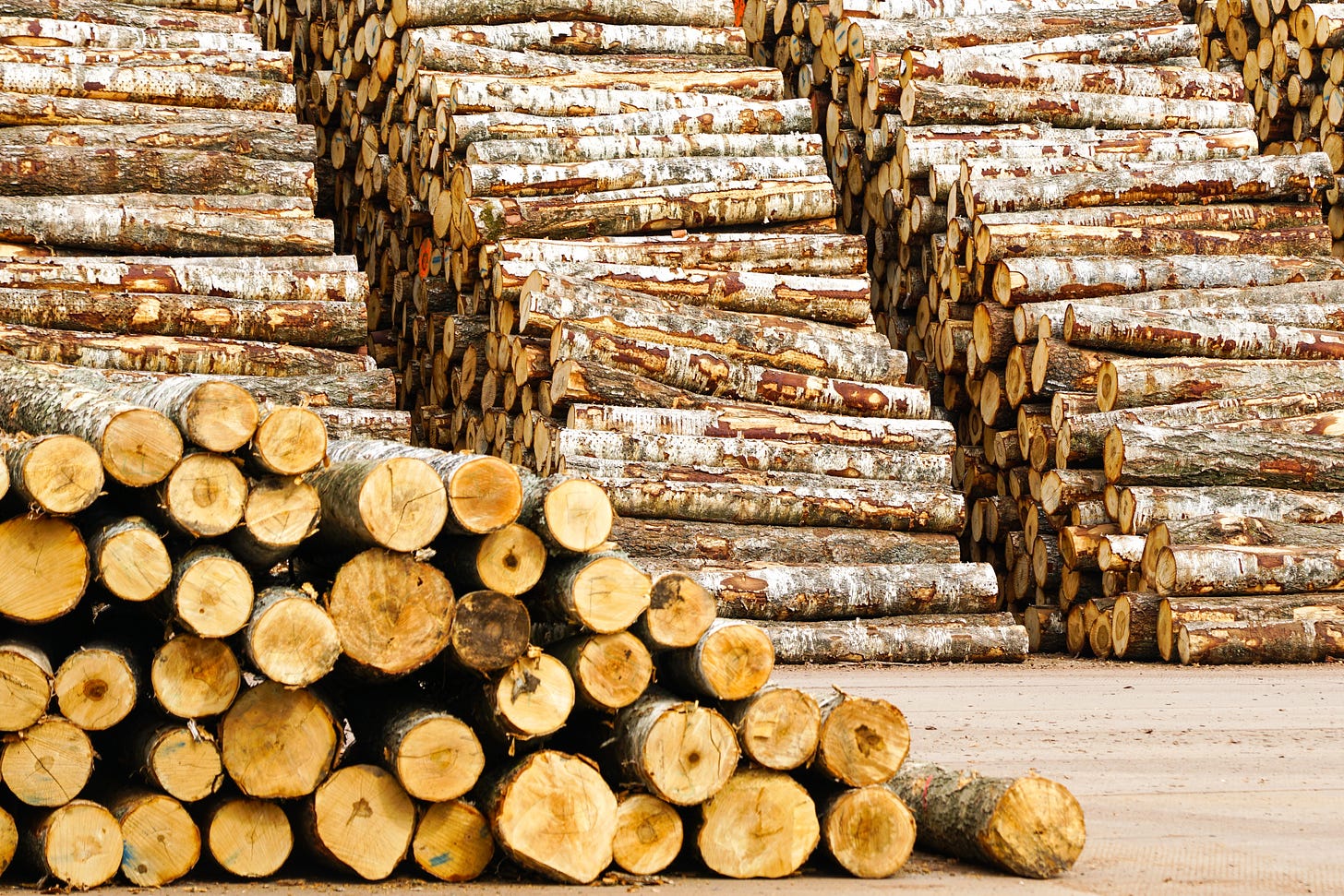
Consumption of birch plywood has skyrocketed across the US and Europe and has played an increasing role in interior design with influencers recommending it for kitchens and furniture.
According to Earthsight seven of the top 10 Russian suppliers are still supplying the EU.
Two of these firms are linked to billionaire oligarchs who met with Putin on the day of the invasion of Ukraine. One, Alexei Mordashov, is on the EU’s sanctions list while the other, Vladimir Yevtushenkov, is the main shareholder of Russia’s largest logging firm. Belarusian state-owned firms are helping facilitate the trade and also selling banned wood products to the EU.
Timber is a significant contributor to Russian GDP and exports.All forests are state owned. The military even directly controls and profits from forests that cover more than one and a half times the size of Belgium.
Several admitted
Several EU firms admitted buying illegal Russian plywood in covert recordings. Although these firms are traders, selling the ply on to others, the investigation also names several prominent EU customers of firms which admitted laundering Russian plywood.
One such customer is the world’s largest manufacturer of artificial climbing walls and was a supplier for qualifying rounds for the 2024 Paris Olympics, Bulgarian firm Walltopia. Another customer is Estonian firm Technomar and Adrem, which supplies flooring to the Radisson, Hilton and Marriott hotel chains. Others include Werxal in Poland, which supplies furniture retailer Black Red White, and a Bulgarian toy manufacturer Komfort, which claims to supply some of Europe’s biggest wooden toy companies.
Earthsight’s timber and sanctions team lead Tara Ganesh said: “Profit-hungry smugglers find it all too easy to launder plywood through third countries and into Europe via soft entry points. It’s so easy that as much as a fifth of all the birch ply on sale in Europe today is thought to be illegal Russian blood timber. With the outlook for Ukraine looking bleak, Poland should use its current Presidency of the EU to end this blood-stained trade once and for all.”
There is an impressive amount of detail presented by Earthsight on its website which is well worth reviewing. The NGO also takes great pride in transforming its investigations into action, persuading governments and corporations to change their practices and policies as a result.
Reference
Earthsight Blood stained birch investigation
3 minute read
A bumper year for Bashar al-Assad as he is named corrupt person of 2024
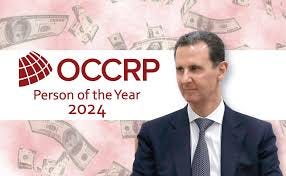
Every year the The Organised Crime and Corruption Reporting Project (OCCRP) selects the person who does the most ‘to wreak havoc around the world through organised crime and corruption’ as the winner of their ‘Person of the Year’ award.
And it’s unsurprising to learn that the 2024 winner has been announced as ousted Syrian dictator Bashar al-Assad.
When Assad and his entourage fled to Moscow on December 8 he left a legacy of misery and criminal cruelty in his wake.
As OCCRP reported in its announcement: “Assad’s regime was characterised by centralised control, suppression of dissent, and a reliance on a powerful security apparatus. His forces were accused of widespread human rights abuses, including torture, murder, the use of chemical weapons, mass detentions, and the targeting of civilians.
Financed by Captagon
“Financed by production of the street drug Captagon and other forms of organised crime, such as human and cigarette smuggling, antiquities theft, and the arms trade, Assad’s regime earned billions of dollars to maintain his brutal authoritarian rule, while spreading violence, drugs, and criminality throughout the region.”
In making their decision the judging panel (made up of investigative journalists and experts on corruption) acknowledge the widespread harm done by the Assad regime since the dictatorship first came to power under Bashar’s father Hafez in 1971.
Following the revolution of 2011 came the Syrian civil war during which more than a half a million people were killed, and millions made refugees.
“In addition to being a dictator like his father before him, Assad added unimaginable dimensions of crime and corruption, ruining the lives of countless people even outside the border of his own country,” said Arab investigative journalist Alia Ibrahim, who was a judge in the contest this year. “The political, economic, and social damage caused by Assad, both in Syria and in the region, will take decades to overcome.”
For the first time in the contest’s 13-year history, the judges have also awarded a special “Lifetime Non-Achievement Award.” which went to Equatorial Guinea President Teodoro Obiang Nguema Mbasogo, one of the longest serving dictators in the world.
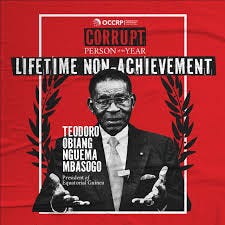
After leading a coup in 1979 to seize power from his uncle, Obiang has brutally repressed any dissent with unlawful arrests, forced disappearances, and torture.
Reference
It’s free to subscribe and you can cancel anytime, so give it a try!
Contact us on greatjournalismwjm@gmail.com
Follow us on Facebook and Twitter
facebook.com/whyjournalism matters
X-twitter @JournalismWhy
Aussi disponible en français!

